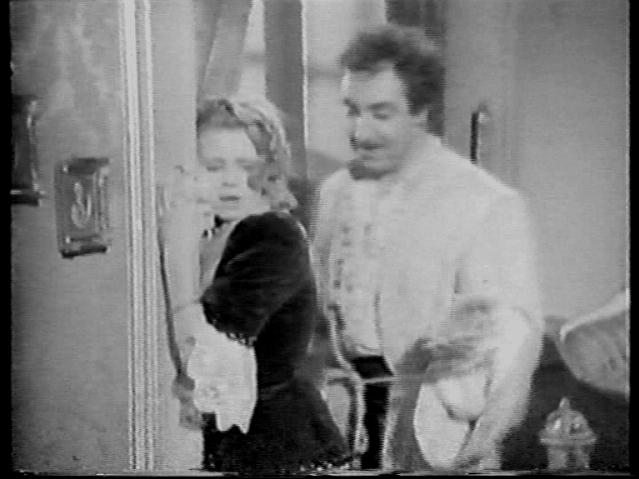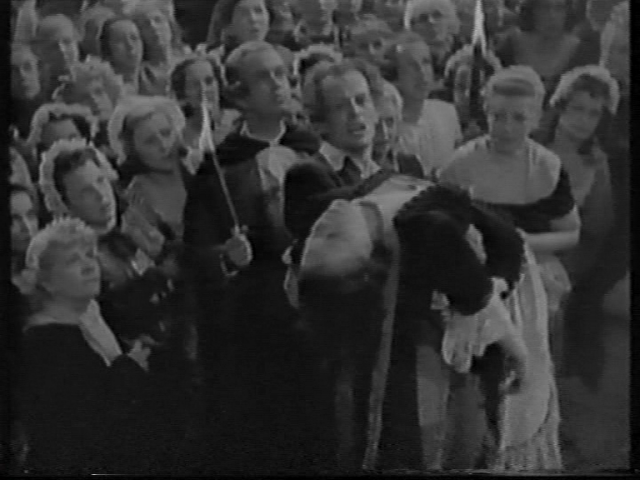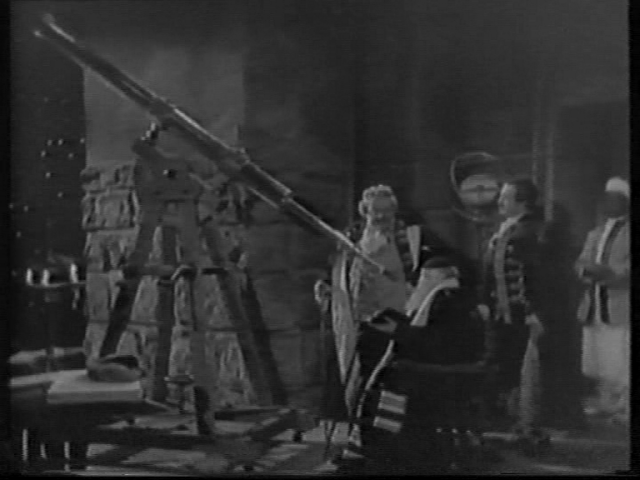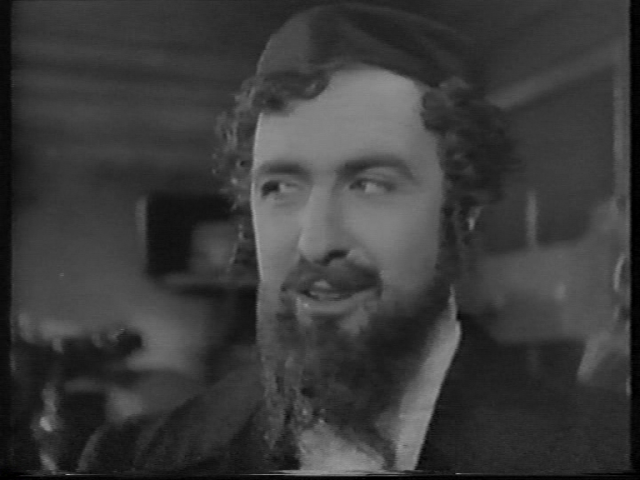My Struggle
Are some films best forgotten?

The newly appointed Duke of Württemberg relaxes the laws preventing Jews from entering his city, so that he can borrow from moneylender Suss Oppenheimer. Oppenheimer slowly takes control of the city through the corruptible Duke, and seeks to gain possession of a beautiful Aryan girl, daughter of a town councilor.
I watched Veit Harlan's Jud Suss with trepidation. I wasn't afraid that the movie, a virulently anti-Semitic melodrama made in Nazi Germany in 1940, would corrupt me with its repulsive slant on history. One would have to be a full-blown racist to begin with to be seduced by the film. I was more worried that the mere decision to watch, to show an interest in this piece of damned celluloid, was a sign of moral weakness.
As usual, my voyeuristic impulse got the better of me, and I watched, so you don't have to. As I suspected, the film is a failure as propaganda for anyone not already steeped in anti-Semitism. Rather than starting with Oppenheimer as a neutral character, trusted by the gentile heroes, the film assumes his evil from the start, and shows that all the "right-thinking" Germans already despise him. Even the decadent Duke loathes Oppenheimer, but thinks he can make use of him. This had the reverse of the intended effect on me, making me side with Oppenheimer and do my best to maintain sympathy with him no matter how abhorrent his crimes (murder, torture, rape). So maybe the film was corrupting me, in a different way. It's like a moral black hole, and light trying to escape gets bent from its course.
The historical events distorted in Jud Suss had already received a more sympathetic airing. In the 1934 British film Jew Suss, Conrad Veidt plays Oppenheimer as a hero, storing up political power to end the oppression of his people. Harlan's remake (or unmake?) of the Michael Balcon production not only wrenches the moral compass 180 degrees to make Oppenheimer a slavering villain, it grotesquely steals sequences outright, including the snowfall that greets the title character's death. As Conrad Veidt is hanged in a kind of iron bird-cage, director Lothar Mendes elevates his camera over the crowd as if in simulation of the dying man's point of view. When the screen fades to black, it is death come upon us. The German "re-imagining" (or "de-imagining"?) juggles the same elements to rather different effect...
The film might not be worthy of discussion at all if its aesthetic qualities matched the diabolical standard of its political ones. But it's not only well-made, but actually stylish and impressive, using its high production values with vigour and even wit. As Oppenheimer sprinkles gold coins on a desktop to pay for the Duke's proposed ballet, Harlan dissolves to a high angle of pirouetting ballerinas, their tutus forming bright discs just like the coins. I had imagined that German cinema was artistically crippled by the flight of the best filmmakers to America, but as in France, new filmmakers came through to take the place of those departed. Of course, Harlan is no Lang or Renoir. But he's more than a hack, and he devotes his energy and talent to making the best anti-Jewish porno-propaganda film he can.

The Resistible Rise
The pornographic element is apparent early on, when a cheering woman at the Duke's inaugural parade loses her top, to the Duke's leering satisfaction. One is reminded of all the women who bared their breasts at Hitler, a strange phenomenon hinting at the hidden psychosexual nature of fascism. While the Duke's lechery is an early sign of the inner depravity that will lead him to fraternise with the ethnic other, it's notable that the film invites its audience to enjoy the same erotic spectacle as him. All through the story, in fact, different levels of vice are offered up for the audience to simultaneously tut their disapproval at, and lasciviously enjoy. Marlowe's The Jew of Malta may have inspired this fascinatingly two-faced approach, although the Nazi film never approaches Marlowe's moral ambiguity: except accidentally.
The climax of the film's sinister sexual side is the rape of the innocent Dorothea, played by the director's own wife, Kristina Soderbaum. Oppenheimer has imprisoned the maid's newly-wed husband, Faber (to heighten the horror, we're assured that the marriage is as yet unconsummated) and has him tortured with thumbscrews in a dungeon opposite his boudoir. By waving a handkerchief from the window he is able to stop the enhanced interrogation at will, and makes it clear that Dorothea's submission is his price. Veit cunningly fades out without specifying whether Dorothea gives in or is overpowered, preserving her virtue in the minds of the audience.

What follows is the revenge, as Dorothea's suicide enrages the populace, the town council stages a revolt, and the fat Duke died of a heart attack, leaving Oppenheimer without his single ally. The climax seems to draw a direct line between the angry mob of torch-wielding villagers in the Universal Frankenstein movies and the torchlight parades of Leni Riefenstahl's Triumph of the Will, especially as the hero carries Dorothea's dead body into the town, exactly like the father of the drowned child does in James Whale's German-influenced classic. As Oppenheimer is hanged in an iron cage, amid slowly drifting starscapes of fleecy snow, the camera crane pushing gently through to alight on the faces of the heroic townsfolk, looking on not with hatred but with noble and implacable solemnity, my stomach turned in sympathy with the dangling villain.
A genuinely odd thing about this wretched spectacle is how the story charts the slow decay of a constitutional government. It's this which is the most compelling and convincing aspect of the story, with both modern resonance and an allegorical relationship, surely unintended, with the rise of Adolf Hitler. Oppenheimer is given power in exchange for the wealth he can supply, whereas Hitler was able to offer popularity to a minority government. The road to hell is laid with cobbles of opportunism.

The Protocols of the Elders of UFA
The exact propagandistic purpose of the film is artfully disguised. True, audiences emerging from the cinema were reported to randomly attack passing Jews, so as a mob-rousing piece of dreck it was effective, but this could not have been its primary goal. In fact, the film largely argues for segregation, and it's the allowing of a single Jew into the city that leads to all the trouble. Jews who pass for gentile are considered more dangerous than the obvious kind, and the Rabbi played by Werner Krauss is more cautious and religious than Oppenheimer, but no more honest. The film could best be considered a success in its goals if audiences were made to feel that the Jewish populations of Europe would be best place...elsewhere. The movie does not propose extermination, although it does show the edifying spectacle of a single Jew being publicly executed. But it paves the way for an entire people to quietly disappear.

The People
Leading actor Ferdinand Marian at first refused the role, but Goebbels persuaded him to play the part "emphatically." Marian's lip-smacking relish rendered him unemployable after the war, and his 1946 death in a car crash was rumoured to be suicide.
Veit Harlan, who trained under Max Reinhardt, like Murnau and Lubitsch and Dieterle, went on to make many more films, until his death in 1964. He was the uncle of Christiane Kubrick.
While Harlan's first wife died in Auschwitz, a few years after Jud Suss hit cinemas, his third wife, actress Kristina Soderbaum, survived and continued to act until the early 90s, although leading roles were denied her. She frequently expressed guilt over her work in Nazi propaganda cinema.
The most famous participant in the movie today is Werner Krauss, who achieved immortality at the age of 35 by playing the evil/good Dr Caligari for Robert Weine. A seven year gap in his career from 1943 signals his period of cocooning, followed by a return to starring roles in West German movies.
Heinrich George, the fat Duke, was captured by the Russians and died in captivity. His remains were eventually discovered in an unmarked mass grave, in 1994.
Conrad Veidt, star of the original, noble Jew Suss, survived a Nazi assassination plot and emigrated to America, where he raised money for anti-Nazi causes by playing Nazis in Hollywood thrillers, notably Casablanca.
***
The Forgotten is a regular Thursday column by David Cairns, author of Shadowplay.